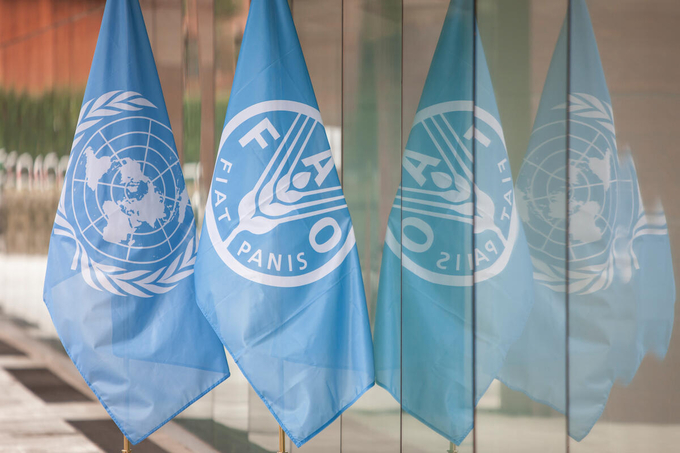November 28, 2025 | 06:35 GMT +7
November 28, 2025 | 06:35 GMT +7
Hotline: 0913.378.918
November 28, 2025 | 06:35 GMT +7
Hotline: 0913.378.918

Flags at the entrance of the FAO Headquarters building.
The Food and Agriculture Organization of the United Nations (FAO) has welcomed a decision to hold at its headquarters in Rome, Italy the resumed sessions of the UN Biodiversity Conference, including the Sixteenth meeting of the Conference of the Parties (COP16) from 25 to 27 February 2025.
In October 2024, delegates from 196 countries met in Cali to discuss the state of implementation of the Kunming-Montreal Global Biodiversity Framework (KMGBF) and the global progress in conserving and sustainably using biodiversity.
At COP16, countries were able to adopt several key and monumental decisions, but a number of draft decisions were not considered by the final plenary and are therefore pending adoption. Hosting COP16 at FAO headquarters is a clear signal of the importance of mainstreaming biodiversity across all sectors through a comprehensive ‘whole-of-society’ and ‘whole-of-government’ approach.
FAO reiterates the particular importance of involving the agricultural sectors (crops, livestock, forestry fisheries, aquaculture), as agrifood systems play a critical role in achieving the global biodiversity goals and targets.
FAO Director-General QU Dongyu welcomed the opportunity to highlight how agrifood systems are a source of solutions to biodiversity loss and related challenges and stated that “Global agrifood systems depend on biodiversity, and biodiversity loss is a threat to agricultural productivity, impacting food availability, accessibility, and affordability, thereby undermining food security.
The resumed session of COP16 will be an important opportunity to strengthen the commitment to support and scale up sustainable and resilient agrifood systems through enabling policies and practices that reach rural and agricultural communities that depend on and are custodians of biodiversity.”
At COP16, FAO launched the Agri-NBSAPs Support Initiative, to provide targeted support to governments across agrifood sectors in order to accelerate the integration of agrifood solutions into biodiversity plans and their implementation and to achieve the KMGBF.
This Initiative responds to the requests from countries for targeted financial and technical support to promote sustainable use of biodiversity through agrifood sectors. It focuses on enhancing policy coherence, institutional capacity, and the adoption of biodiversity-friendly practices to achieve food security and sustainable agriculture, forestry, fisheries, and aquaculture systems.
FAO will continue to convey its message on the importance of better integrating biodiversity into agrifood sectors and agrifood solutions into biodiversity plans and actions to help countries achieve their biodiversity commitments through their National Biodiversity Strategies and Action Plans (NBSAPs).
(FAO)

(VAN) On November 27, in the meeting with Minister Tran Duc Thang, Mayor Yin Yong shared Beijing’s experience to improve environment and air quality.

(VAN) After 30 years, both sides identified strategic areas of cooperation: sustainable production, increasing coffee value and training for farmers.
/2025/11/27/4910-4-164708_294.jpg)
(VAN) On the afternoon of November 27 in Beijing, Minister of Agriculture and Environment Tran Duc Thang held a working session with several major Chinese enterprises operating in the agriculture and environment sector.

(VAN) The Department of Animal Health issued a provisional guideline requesting local authorities to increase surveillance, collect samples for testing, and conduct epidemiological investigations according to the established procedure.

(VAN) The United Nations recommends that Vietnam utilize data and artificial intelligence to enhance early disaster warnings and reduce GDP losses by 3.2% in the context of climate change.

(VAN) On the morning of November 27 in Beijing, Minister Tran Duc Thang and the Deputy Commissioner General of the General Administration of Customs of China signed a protocol on fresh jackfruit exports.

(VAN) As floodwaters recede, a vast network of irrigation works across eastern Gia Lai is emerging in a state of severe disrepair, with extensive damage demanding urgent restoration ahead of the 2025-2026 winter-spring cropping season.